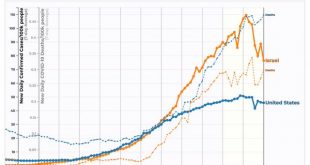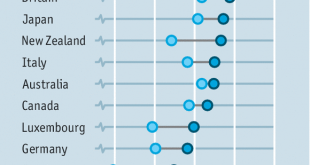from Geoff Davies and RWER Yet consider a model of the Global Financial Crisis of 2007-8 by Eggertsson and Krugman (2012), the latter a pseudo-Nobel prize winner. They made two models, one for before and one for after a crash, with the difference between the models being effectively that the amount of available credit was presumed to be less in the second. Nothing in the model determined the amount of credit, it was imposed from the outside. Their equations of optimisation did require...
Read More »Affordable electricity Decarbonization in OECD countries? Part I
After eight extensive posts about the Ontario electricity sector, I am expanding my geographic coverage to look at the electricity sectors in selected OECD countries. My focus will be on the historical and relative performance of each country’s sector with respect to decarbonization and prices. As in the case of Ontario, whole volumes could and have been written about each of these countries, and the electricity sector in general, including with respect to current and future reliability...
Read More »Maybe inflation should be welcomed
from Philip George Until 1982 it was believed that stomach ulcers were caused by stress and lifestyle. That year, two Australian scientists, Robin Warren and Barry Marshall, demonstrated that most gastric and duodenal ulcers were caused by a bacterium, Heliobacter pylori. They cultivated the bacteria which they discovered in biopsies of patients suffering from ulcers, after which Marshall ingested the bacteria to prove that they caused gastric ulcers. As this example shows, it is not...
Read More »A classical utilitarian position implicates that individuals have no moral rights
from Tanja von Egan-Krieger and RWER . . . the World Bank builds on a utilitarian definition of efficiency, which is of course a normative criterion. It is a criterion of judgement. The implicit aim is increasing the net value or total wealth. The World Bank refers to this idea in terms of a “social benefit”: “Even investments that are highly profitable for an investor will generate sustainable social benefits only if they are not associated with environmental externalities”. An ethical...
Read More »Weekly Indicators for September 6 – 10 at Seeking Alpha
by New Deal democrat Weekly Indicators for September 6 – 10 at Seeking Alpha My Weekly Indicators post is up at Seeking Alpha. The big surprise of the past several months has been how little effect the Delta wave has had on the data, and in particular consumer data. As usual, clicking over and reading hopefully is rewarding to you, and a tiny bit rewarding to me as well. ...
Read More ». . . broken into multiple disconnected compartments of western understanding
from Richard Norgaard . . . until early in the 19th century, merely two hundred years ago, an effort to intertwine reality and morality still existed in natural theology, the project to understand the character, will, and operating manual of God through the study of nature. Isaac Newton was both an accomplished moral philosopher and a path-breaking natural philosopher (Iliffe, 2017). The Physiocrats made moral arguments about who should be taxed based directly on what they understood to...
Read More »Coronavirus dashboard for September 10: was Labor Day indeed the peak of the Delta wave?
Coronavirus dashboard for September 10: was Labor Day indeed the peak of the Delta wave? I have been saying for some time that the Delta wave would probably peak around Labor Day. It’s not certain yet, but it is looking increasingly likely to have been the case. The Delta wave struck in both the US and Israel at almost the same time, with almost the same vaccination profiles. Here’s what cases per capita (bold lines) and deaths per capita...
Read More »Rising Inequalities in OECD Countries – Gini coefficients 1985 vs 2013
Source: Sighing for paradise to come | The Economist
Read More »Weekend read – Kant: misogynist & racist
from Asad Zaman and WEA Pedagogy Blog Reducing politics to rational calculation allows the destruction of entire countries, and killings of millions, for the sake of political power or corporate profits. Today this “rationality” dominates the world where corporations are busy destroying the planet for the sake profits. Introduction: The dark underside of leading lights of the European Enlightenment has been skillfully concealed. Nearly all major enlightenment thinkers held abhorrent views...
Read More » Heterodox
Heterodox



